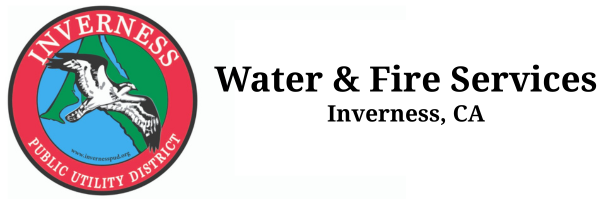INVERNESS WATER SHORTAGE EMERGENCY HAS ENDED
May 3, 2023:
The Water Shortage Emergency in effect in the Inverness Public Utility District since July 2020 was terminated by the District’s Board of Directors on April 26, 2023. Of greatest interest to many of IPUD’s Water System customers is that the prohibition on use of outdoor irrigation systems has been lifted.
The Board studied three principal data streams in determining whether the Water System will be able to satisfy customer demand for at least the next year without jeopardizing its capability to provide sufficient water for human consumption, sanitation, and fire protection.
RAINFALL. Average annual rainfall over the past 92 years is 37.26 inches. As of the morning of May 3, our rainfall measurement since July 1 has reached 48.25 inches, which places the 2022/23 rainfall year among the top 20% of the wettest years on record in Inverness. Moreover, the rain this year was concentrated in the second half of the rainfall year (since January 1) and its pattern has been of the slow, steady soaker variety, rather than of the high-deluge, fast-runoff type. These three factors – how much rain, when it fell, and how it fell – have combined to create almost the ideal rainfall year for recharging our parched watershed after almost three years of severe drought conditions.
STREAMFLOWS. A benchmark we use for assessing water retention in the watershed is the amount of runoff flowing in the streams that cascade down into First, Second, and Third Valleys. This is a subjective metric, but our experience over more than four decades is that the watershed is healthy whenever the streams reach a flow rate of at least 1,000,000 gallons per day at any time between February and May. Already at the beginning of April this year, the flow rate was measured at a reassuring 2,332,800 gallons per day. Experience suggests that this figure means that we will have no water shortage problem for at least the next year.
CUSTOMER DEMAND. Going into the drought three years ago, our water sales averaged 67,900 gallons per day (higher in the summer, of course, and lower in the winter). After almost three years of intense water conservation measures, including the near ban on outdoor watering, the District’s sold water average has dropped by 39.6% to 41,000 gallons per day. The end of the emergency will undoubtedly result in an increase in customer usage, but experience tells us that demand rises only slowly, especially after a water shortage emergency has been in effect for as long as this one has. We also believe that some customers’ previous higher-water-usage habits will have been replaced by a more purposeful conservation ethic. Probably also, some customers will never return to their outdoor watering habits of the pre-drought years.
On the basis of a high-rainfall year, copious streamflows, and the evolution of our community’s conservation ethic, the IPUD’s Directors determined that not only had the time come to end the emergency, but that it was also important to express the appreciation of the Directors and the Water System’s staff for the outstanding and effective cooperation of our customers during these past three years. We encountered not a single instance of a hesitance (much less a refusal) to cooperate. It has been a challenging three years, but the silver lining has been that we could always tell that the community was behind us. Thank you so very much!
HOWEVER, all this good news needs to fit into the reality that even in the best of years we have a fragile water supply that is wholly dependent on the day-to-day flows in a network of quite small streams. Our system has no reservoirs or any other type of long-term storage, so no matter how good things look during the wet months of the year, we will always be straining to some extent to get through the drier months of summer and fall. Living or owning property in Inverness obligates all of us to respect that the water supply is a very finite and limited resource and that there’s no margin for even one customer to make extravagant use of the community’s water.
Here are some things to keep in mind about the end of the Water Shortage Emergency:
- The restrictions on use of irrigation systems are lifted. But make sure the timer devices that control irrigation systems are functioning correctly and have fresh batteries (if applicable). Also, consider carefully how long you really need to water and how often. Check for leaks in drip irrigation lines and that spray heads are aimed properly.
- Power-washing of buildings and exterior surfaces is OK and no permit is needed.
- You can wash vehicles, but you must use a hose with a shutoff nozzle.
- You cannot use potable water in a manner that permits flow onto roadways, into gutters, or down storm drains.
- Decorative fountains must recirculate the water.
- Using potable water to wash sidewalks, driveways, parking areas, and other hard surfaces is discouraged (and becomes prohibited if runoff into roadways, gutters, or storm drains occurs).
- It is best to run dishwashers and washing machines only when they are fully loaded (and ask if a short cycle or quick wash will do).
- Every time you turn on a faucet, THINK about how much water you are using and what you are using it for.
